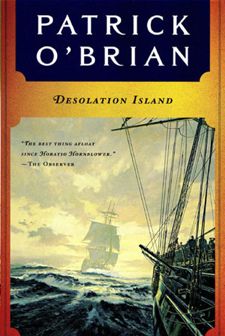Desolation Island is where I think the series gets really brilliant. It’s where I stop being able to put them down between books to read other things. It’s one of the places that I suggest people can start it, if they don’t want to start at the beginning, because it’s where the plot begins.
Spoilers start here.
So Desolation Island begins, much like H.M.S. Surprise and The Mauritius Command, in England with a voyage proposed. But it’s also all different—Stephen doesn’t want to go, because he’s going to see Diana. Also, the other two voyages were planned with his intelligence work in mind, this one isn’t—it’s a trip to New South Wales where the colonists have mutinied against that much-mutineed-against Captain Bligh.
Stephen does take the trip, and the trip does get an intelligence angle when Diana’s American friend Lousia Wogan is caught spying and transported. Sir Joseph then contrives to have her transported on the Leopard in the hope that Stephen can get some information out of her. Diana has fled to American with Johnston as part of the same issue. We see a little of Jack and Sophie at home, with the children growing up, and Sophie being beautifully sophistical persuading Jack to go to cheer Stephen up. “But if you had heard him speak of wombats, just in passing!”
The reason Sophie wants him to go is because he has caught Andrew Wray cheating at cards and challenged him, and she is afraid of a duel. There is no duel, and Wray’s revenge takes volumes more—this incident isn’t fully resolved until the end of The Commodore. This little moment in the card room (beautifully set up, with Stephen first detecting the deception and then Jack, on another occasion, challenging it) has consequences nobody could foresee and which unwind at a pace fictional consequences rarely have the space for. Plot usually works like a tsunami, but this is plot as a groundswell, plot that starts off as a little handkerchief of cloud on the horizon that blows into a great storm. We don’t even see Wray again for several volumes. But this is where it begins.
The whole of the rest of the volume is pure voyage, all journey with no destination—we never see New South Wales on this trip. And it’s all delightful—Wogan’s lover Michael Herapath, a Chinese scholar and an American loyalist, stows away to be near her. It is 1811, and relations with the Americans are troubled because they don’t see fighting Napoleon as the most important thing in the world. The War of 1812 (“one of the brushfire wars on the sidelines of the Napoleonic Conflict” as Heinlein called it) is about to start, over the issue of pressing sailors from American vessels.
The Leopard—the “horrible old Leopard” is a fifty gun ship. The convicts bring gaol fever aboard—the fever sequence is an amazing piece of writing—and so she is woefully undermanned when, in far southern latitudes, she is chased by a Dutch seventy-four. The Waakzaamheid sinks in the far southern seas. This is one of the best bits of the series, the whole chase, Jack’s thought processes, the danger to the ship from weather and enemy simultaneously—it’s marvellous, better than anything that has gone before. At the same time, there’s Louisa Wogan and the way Stephen is feeding her poisoned information to get back to the French and the Americans, he needs her to escape with it, but he’s afraid that Herapath’s honour will prevent him from fleeing. This whole thing, with Stephen’s concern about Diana and burgeoning opium addiction is just wonderful. The balance is exactly right.
The consequences of the chase are that the Leopard loses her rudder, and the Lieutenant Grant takes an open boat to bear up for the Cape, and the rest of them are marooned on Desolation Island. Stephen is happy with cataloguing and discovering new species, but everybody else wants to leave—then an American whaler comes in, with war on the point of being declared and a great deal of suspicion on both sides. The sequence where Stephen treats their patients and leaves the Captain’s toothache for last is brilliant—and it isn’t an exchange for the use of the forge, oh no, except that it is.
The book ends with the escape of Wogan and Herapath on the whaler. It ends with Jack and Stephen still on Desolation Island, but with the Leopard repaired. They are not at home, nor even homeward bound as they have been at the end of the two preceding volumes. This is a happy ending in that Stephen’s poisoned chalice of intelligence will get back via Wogan, but it isn’t really an ending in the conventional sense at all.
As well as everything else I like about this book, it seems to me that this is where O’Brian got the balance between Jack and Stephen right. The point of view has always glided between them, glancing off on others from time to time or into true omniscient. But in the earlier books there was often more of one or the other, here (and from here on) we have the perfect mixture.
In continuing characters, the book introduces Wogan and Herapath and Wray. We see Babbington, now a lieutenant with a big dog, and Killick, becoming more irascible and acquiring his moral ascendancy over Jack, and Bondenof course dear Pullings is first lieutenant. Pullings is one of my favourite characters.
I ought to be able to find something to criticize about it, but I can’t. Sorry, nothing but uncritical adoration here.
Jo Walton is a science fiction and fantasy writer. She’s published eight novels, most recently Lifelode, and two poetry collections. She has a ninth novel coming out in January, Among Others, and if you liked this post you will like it. She reads a lot, and blogs about it here regularly. She comes from Wales but lives in Montreal where the food and books are more varied.










